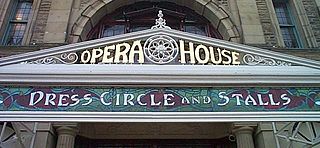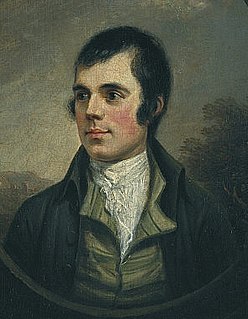
The Edinburgh Festival Fringe is the world's largest arts and media festival, which in 2018 spanned 25 days and featured more than 55,000 performances of 3,548 different shows in 317 venues. Established in 1947 as an alternative to the Edinburgh International Festival, it takes place in Edinburgh every August. The Edinburgh Festival Fringe has become a world-leading celebration of arts and culture, surpassed only by the Olympics and the World Cup in terms of global ticketed events. As an event it "has done more to place Edinburgh in the forefront of world cities than anything else" according to its historian and former chairman of the board, Michael Dale.

The Edinburgh International Book Festival (EIBF) is a book festival that takes place in the last three weeks of August every year in Charlotte Square in the centre of Scotland’s capital city, Edinburgh. Billed as The largest festival of its kind in the world, the festival hosts a concentrated flurry of cultural and political talks and debates, along with its well-established children's events programme.
The Scottish Renaissance was a mainly literary movement of the early to mid-20th century that can be seen as the Scottish version of modernism. It is sometimes referred to as the Scottish literary renaissance, although its influence went beyond literature into music, visual arts, and politics. The writers and artists of the Scottish Renaissance displayed a profound interest in both modern philosophy and technology, as well as incorporating folk influences, and a strong concern for the fate of Scotland's declining languages.

The culture of Scotland refers to the patterns of human activity and symbolism associated with Scotland and the Scottish people. The Scottish flag is blue with a white saltire, and represents the cross of Saint Andrew.

A makar is a term from Scottish literature for a poet or bard, often thought of as a royal court poet.

The Celtic Connections festival started in 1994 in Glasgow, Scotland, and has since been held every January. Featuring over 300 concerts, ceilidhs, talks, free events, late night sessions and workshops, the festival focuses on the roots of traditional Scottish music and also features international folk, roots and world music artists. The festival is produced and promoted by Glasgow Life. Donald Shaw, a founding member of Capercaillie, was appointed Celtic Connections Artistic Director in 2006.
The Skinny is a 72-page monthly and bi-monthly publication distributed in approximately 1,450 establishments throughout the cities of Dundee, Edinburgh, Glasgow in Scotland and, from 2013 to 2017, Manchester, Liverpool and Leeds in the north of England. Founded in 2005, the magazine features interviews and articles on music, art, film, comedy and other aspects of culture.

The Scottish Storytelling Centre, the world's first purpose-built modern centre for live storytelling, is located on the High Street in Edinburgh's Royal Mile, Scotland, United Kingdom. It was formally opened on 1 June 2006 by Patricia Ferguson MSP, Minister for Culture in the Scottish Executive. Donald Smith is Director of the Scottish Storytelling Centre, and himself a storyteller, playwright, novelist and performance poet.

The Buxton Festival is an annual summer festival of opera, music and a literary series, held in Buxton, Derbyshire, England since its beginnings in July 1979. The 2020 festival would have run but was cancelled due to the Covid-19 crisis. The 2023 Buxton International Festival will run 6–23 July.
Arthrob were an underground arts collective in London during the mid-late 1990s. They organised cultural events such as book readings and theatre in nightclubs, aiming to bring together club culture and the arts.
Robert Crawford is a Scottish poet, scholar and critic. He is currently Professor of English at the University of St Andrews.

The Stand Comedy Club is a chain of three stand-up comedy venues in the cities of Edinburgh, Glasgow, and Newcastle upon Tyne.
The International Novi Sad Literature Festival was founded by the Association of Writers of Vojvodina in 2006. The Festival is held in Novi Sad еvery year in August and September.

Word – University of Aberdeen writers festival was a book festival that took place from 1999 until 2011, initially every two years and latterly every year, over a weekend of May at the University of Aberdeen. Authors, thinkers and commentators from all over the world came each year to Aberdeen for a three-day celebration of the written word with a mix of readings, discussions, films and exhibitions. There was also a Schools' and Children's festival.
Sophie Cooke is a Scottish novelist, short story writer, poet, and travel writer. Speaking in an interview with Aesthetica magazine in 2009, Cooke has said that her work is primarily concerned with questions of truth. She has developed the notion of truth as a depreciable asset. Cooke's work deals with the concealment of truth on various levels, from personal self-deceptions to governments misleading the public. She is the author of the novels The Glass House and Under The Mountain.
The NGC Bocas Lit Fest is the Trinidad and Tobago literary festival that takes place annually during the last weekend of April in Port of Spain. Inaugurated in 2011, it is the first major literary festival in the southern Caribbean and largest literary festival in the Anglophone Caribbean. A registered non-profit company, the festival has as its title sponsor the National Gas Company of Trinidad and Tobago (NGC). Other sponsors and partners include First Citizens Bank, One Caribbean Media (OCM), who sponsor the associated OCM Bocas Prize for Caribbean Literature, CODE, and the Commonwealth Foundation.

Edinburgh Grand Opera is Scotland's oldest existing grand opera company, founded in 1955 by Richard Telfer. This Edinburgh Music Society is run by its non-professional chorus with advice and support from the professional Artistic and Musical Directors and Designers it engages. It was originally known as the Edinburgh Grand Opera Group, and it has also been referred to as Edinburgh Grand Opera Company. Its soloists are a mixture of amateur, semi-professional and professional singers from Scotland and abroad, many of whom are students or graduates from the Royal Conservatoire of Scotland. It was the first amateur company to perform at the Edinburgh Festival Theatre.
Damian Leighton Barr is a Scottish writer and broadcaster. He is the creator and host of the Literary Salon, which started at Shoreditch House in 2008, and he hosts live literary events worldwide. In 2014 and 2015, he presented several editions of the BBC Radio 4 cultural programme Front Row. He has hosted several television series including Shelf Isolation and most recently The Big Scottish Book Club for BBC Scotland. He is the author of the 2013 memoir Maggie & Me, about his 1980s childhood in the west of Scotland, and the 2019 novel You Will Be Safe Here, set in South Africa in 1901 and now. He is a Fellow of the Royal Society of Arts (FRSA).

Scots-language literature is literature, including poetry, prose and drama, written in the Scots language in its many forms and derivatives. Middle Scots became the dominant language of Scotland in the late Middle Ages. The first surviving major text in Scots literature is John Barbour's Brus (1375). Some ballads may date back to the thirteenth century, but were not recorded until the eighteenth century. In the early fifteenth century Scots historical works included Andrew of Wyntoun's verse Orygynale Cronykil of Scotland and Blind Harry's The Wallace. Much Middle Scots literature was produced by makars, poets with links to the royal court, which included James I, who wrote the extended poem The Kingis Quair. Writers such as William Dunbar, Robert Henryson, Walter Kennedy and Gavin Douglas have been seen as creating a golden age in Scottish poetry. In the late fifteenth century, Scots prose also began to develop as a genre. The first complete surviving work is John Ireland's The Meroure of Wyssdome (1490). There were also prose translations of French books of chivalry that survive from the 1450s. The landmark work in the reign of James IV was Gavin Douglas's version of Virgil's Aeneid.

The Dark Horse is an international literary magazine based in Scotland. Founded in 1995 by Scottish poet Gerry Cambridge, it publishes British, Irish, and American poetry as well as literary criticism and interviews. Past contributors include Wendy Cope, Douglas Dunn, Vicki Feaver, Anthony Hecht, Kay Ryan, Matthew Sweeney, Robert Nye, and Richard Wilbur.














